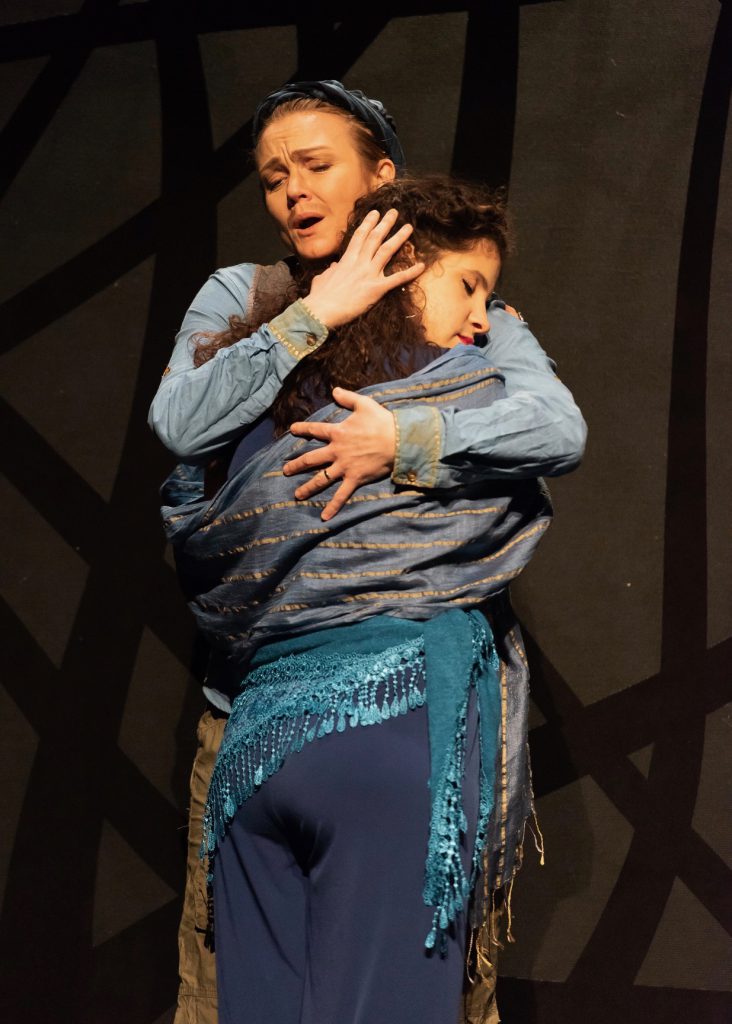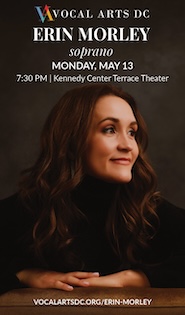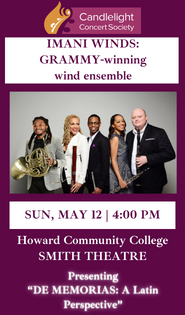Opera Lafayette goes full Handel in style with “Radamisto”

Caitlin Hulcup and Hagar Sharvit in Handel’s “Radamisto” at Opera Lafayette. Photo: Louis Forget
Opera seria was always mostly about the voices of star singers, rather than presenting a convincing drama. Opera Lafayette undertook its first full staging of an opera seria by Handel with the superb Radamisto Tuesday night in the Kennedy Center Terrace Theater. The simplest of stage materials and strong direction was enough to communicate the story, such as it was, leaving the vocal feats of an accomplished cast strongly in the foreground.
The libretto, possibly by Nicola Francesco Haym and based on libretti of earlier operas, is about bad family politics in Armenia and Thrace in the first century. Tiridate, King of Armenia, is married to Polissena, daughter of Farasmane, King of Thrace. The Armenian tyrant lusts instead after Zenobia, the wife of the Thracian king’s son, Radamisto. He takes Farasmane prisoner and invades Thrace to win Zenobia, all while one of his generals is in love with Polissena and another, his sister, is in love with Zenobia. In other words, the state of their union is not strong.
Conductor Ryan Brown chose to perform the original 1720 version of the opera, as edited by Michael Pacholke for the Halle Handel Edition, with just enough music cut to keep the performance to a little over three hours.
Australian mezzo-soprano Caitlin Hulcup made an outstanding American debut in the title role. Hulcup applied a sweet, honeyed legato to the gorgeou “Cara sposa, amato bene,” adorned with elaborate embellishments in the da capo repeat. Her melismas were exceptionally clear and balanced across a wide ambitus, as in “Ferite, Uccidete,” in Act I. The cadenza to this aria, as well as others, featured some high-flying excursions into her upper range as well, a sort of virile sound matched by her convincing male stage characterization. (Handel first conceived Radamisto as a trouser role for a soprano with mezzo-soprano tendencies.)
An equally striking discovery was mezzo-soprano Hagar Sharvit, who was an outstanding Zenobia. In her showpiece aria in the first act, “Son contenta di morire,” she displayed remarkably even articulated runs, and had the extended chest range for Handel’s initial casting of the role for a contralto. Her vocal intensity went well with a forceful stage presence, especially as she alternated between spitting rage and tender sweetness in the cavatina “Empio, perverso cor!”
Soprano Dominique Labelle, who sang a supporting role on Alan Curtis’s top-notch recording, was upgraded here to sing Polissena. An Opera Lafayette regular for years, her voice has grown in scope, with dramatic weight that gave the role considerable dignity. Only in the Act III aria “Barbaro, partiro” did the tone turn a little shallow as she vied admirably with the extended runs.
Robin Yujoong Kim made a favorable impression as Tiridate. His sharply focused, slightly nasal tenor added weight to the tyrant’s arias, strongest in the Act III aria “Alzo al volo di mia fama,” accompanied by the brilliant natural horn playing by Todd Williams and Linda Dempf. Soprano Véronique Filloux had a warm, sumptuous sound as Tigrane, matched by the more flutey tone of soprano Nola Richardson as Fraarte. Bass Alex Rosen, already noted in a small role in 2017 with Opera Lafayette, stood out for the excellent resonance and beauty of his voice as Farasmane.
Handel’s original version of the opera included a short ballet scene to end each of the three acts. Ryan Brown and the Opera Lafayette Orchestra of historical instruments made the most of these rhythmically charged dance pieces. Six dancers from the Seán Curran Company activated the stage in choreography by Curran that was part baroque, part modern dance. The exquisite Passacaille at the end of the second act was a highlight.
Curran also directed the simple but effective staging, with large rolling screens, decorated with vines, and red benches placed in different configurations. Vibrant colored lighting by Rob Siler accented Amanda Shafran’s equally exotic costuming, with the dancing soldiers given modern touches like sunglasses and ammo belts. With the sole exception of some rough patches in the recitative accompaniment, this was a high point in the company’s history of presenting historical operas.
Radamisto will be repeated 7:30 p.m. Thursday in the Kaye Playhouse at Hunter College in New York City. operalafayette.org



